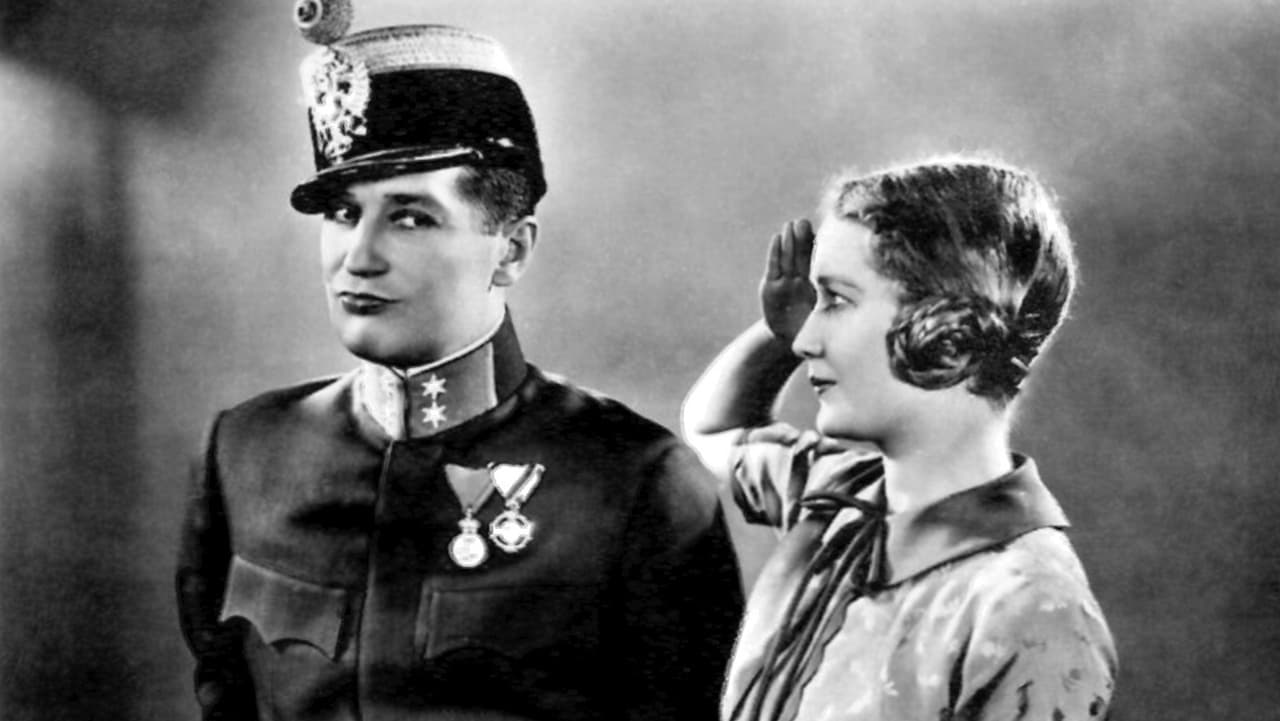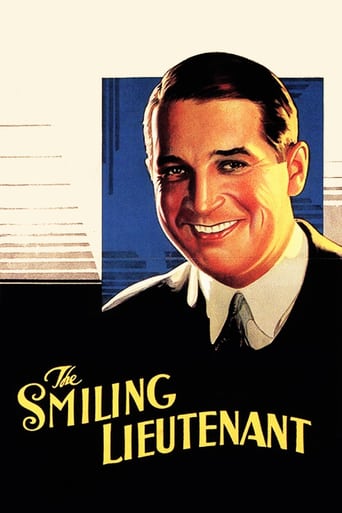

not horrible nor great
... View MoreAn action-packed slog
... View MoreToo much about the plot just didn't add up, the writing was bad, some of the scenes were cringey and awkward,
... View MoreIt is a whirlwind of delight --- attractive actors, stunning couture, spectacular sets and outrageous parties.
... View Morein other words his penis, is exclaimed at one point by Lieutenant Maurice Chevalier to a young Claudette Colbert with their love affair heating up. The sexual innuendo both uttered and shown in this Ernst Lubitsch pre Production Code picture is constant and delicious, resulting in a delightfully fey and elaborate but short eighty minutes following an admittedly batty plot and some note-lucky singing of a few rather dull tunes. Eyebrow-raising lyrics though! It's relentlessly charming with no scenes of a sexual, swearing or violent nature or anything remotely disgusting either; it's all in the mind – which is also worth bearing in mind is as Frank Zappa once sang, the ugliest part of the body.Charlie Ruggles begins by telling his friend Chevalier he's in love with Colbert and then watching his friend swiftly woo and win her for successful and successive nights of passion and mornings of breakfast. Until the day Chevalier smiles at her while on duty but gets publicly misinterpreted instead as having smiled – and winked, meaning let's do it – at the King's plain daughter Miriam Hopkins. How it all turns out is slightly dissatisfying to me, but it was a difficult problem to resolve in a gentlemanly way without a Code to follow. Although I know that even with all the slyness on screen it would have the last thing on their minds in 1931 to portray, what a film it would have been if there had been a concluding Three-Way! The Paramount production values were enormous, the sets intricate and fascinating, the romantic atmosphere under the gleaming studio arc-lights palpable, the cast superb, the display of freshness of youth and optimism appealing and total, and the comparisons with Love Me Tonight, One Hour With You and even Trouble In Paradise justified. But imho it just wasn't as good as any of those masterpieces. There's a Lubitsch touch in here that can sum up the difference: at one point two pillows on a soon-to-be consummation of marriage bed are helpfully moved closer together but then one pillow is even more helpfully put on top of the other. Not offensive at all - but not very subtle either, and if coitus really was to follow the pillows would more than likely be in an awkward position. The Lubitsch Code of what all men want is sex then romance and what all women want is romance then sex was never more apparent than in this, and it depends upon your personal point of view whether you find that point of view charming, childish or irrelevant. And the suddenly worldly-wise Colbert nonchalantly waved at the suddenly renewed Hopkins over her shoulder without looking back and without a care so that made everything alright All that said it's an utterly wonderful film which as I've put for some other perceived-to-be ancient films will still be watched and/or puzzled over in many generations time, while all of today's realistic and amoralistic efforts are long forgotten.
... View MoreAn army lieutenant (Maurice Chevalier) finds love in two completely different places-a cabaret and the palace. In this fictional European country (with a funny name that the country folk can't even pronounce!), the king's daughter (Miriam Hopkins) falls in love with the King's bodyguard (Chevalier), unaware that he is very much in love with the violin player (Claudette Colbert) of a popular girl's orchestra. But when you're the princess, you can get what you want, and she pleads with papa to get permission from the Holy Roman Emperor to marry the lieutenant, whether he likes it or not."Hi, Emp!", the King gleefully says to the Big Man of Europe (after the pope...), getting permission, and stunning Chevaliere into silence and Colbert into tears. But this edict won't make Chevalier consummate the wedding night, so Hopkinsfinds herself playing checkers with papa after Chevalier tells her that you never wink at a husband, only a lover or mistress. "Schnitzel to you!", he adds to the king, heading right back to Colbert.This is motion picture operetta at its best with a pleasant musical score, rhythmic dialog, and enough sexual innuendo to fill up legal documents by the volumes had it been made after the code. Paramount filled several movies with fictional European countries, so when Groucho Marx became dictator of Fredonia in 1933's "Duck Soup", he had a lot of material to spoof. Hopkins transforms from an impish brat into sexy vamp, getting rid of those Princess Leia like rolls on the side of her head when Colbert (in her second film with Chevalier) is charmingly alluring. And when Colbert get together to sing a duet about lingerie, it turns into magical movie heaven.
... View MoreSince this seems to have been largely unnoticed by most of the previous commentators, I will just add a paragraph here to point out that this movie is an adaptation, of sorts, of one of the major hits of the Viennese musical stage during the first decade of the 20th century, Oscar Straus' Ein Waltztraum/A Waltzdream. The characters' names and some of the situations are kept, as are a few of the original numbers, mostly used as background music. (Most of the actual songs are new, and not from the operetta.) You might say "So what?", especially if you have no interest in silver-age Viennese operetta. But this factoid is of interest in that, 3 years later, MGM would try the same thing, once again with M Chevalier directed by Ernst Lubitsch, on another of the major hits of the Viennese musical stage during the first decade of the 20th century, and that time the result would be a smash success: The Merry Widow. (Replacing Miriam Hopkins with Jeannette McDonald helped a lot, as did Lehar's music, which is a lot better that Straus's.) This movie didn't do much for me - neither does A Waltzdream, frankly - but it's interesting to see a first attempt at something MGM, Lubitsch, and Chevalier would soon do so much better.
... View MoreErnst Lubitsch came to Hollywood in the years before the "Code", or censure, if you will, that plagued all artists working during that era. This is a clear example of what could be done in the movies when the scissors of the censor were not in the picture, no pun intended.If you haven't seen the film, please stop reading now.This film is based in an operetta. It's light, it's frothy, it's naughty, and it's a delight to watch it more than sixty years after it was made. Mr. Lubitsch was a genius in creating films that bore his signature like no other director of the time. His European background is constantly in display. He had a sensitivity for giving the viewer a glimpse of that old world he had left behind when he emigrated to America.Mr. Lubitsch worked with the best actors of the times. His choice of Maurice Chevalier, or maybe it wasn't his decision, but the studio's, pays handsomely in this movie. Mr. Chevalier brought his own style to the American cinema and he can be a bit strange in the way he reacts in front of a camera, but in spite of his school of acting, he went to become a favorite in this country too. Mr. Chevalier plays the bon vivant lieutenant in the Austrian army who has a roving eye for any beautiful woman that crosses his path. He finds that, and much more with Franzi, the violinist in charge of an all women's orchestra. It's clear what attracted Niki to Franzi; she is a beauty who aims to please. There is no subterfuge in the relationship; Franzi moves right in into Niki's apartment. This couldn't have been done in the movies later on, when the Hays code came into being.Claudette Colbert had a lot of charisma. In "The Smiling Lieutenant" she shows why she was a star in her own right. Ms. Colbert and Mr. Chevalier made these lovers look right. Nothing is done in the open and everything is done with great taste, although the viewer can guess what's really happening without too much guessing. To complicate matters, our lieutenant is fancied by a dowdy Princess Anna on a visit to Vienna. Since honor is at stake, Niki marries her, but his heart is left behind with Franzi. Niki doesn't want any part of this woman who has been imposed on him. When Franzi and the orchestra make an appearance in the neighboring country, Niki discovers her and they go back to their trysts whenever they find the time, to the chagrin of the princess. Franzi realizing she could never get Niki without causing a great scandal, gives in, and in the process, transforms the "ugly duckling princess" into a lovely swan. Miriam Hopkins playing Anna ends up with the man she wanted. The final scenes suggest that yes, they will have their fun after all.The set decorations of the film are breathtaking. The palace scenes, the costumes, take the viewer to the Austro-Hungarian empire. This film will please anyone looking for an easy time at the movies thanks to Ernst Lubitsch.
... View More